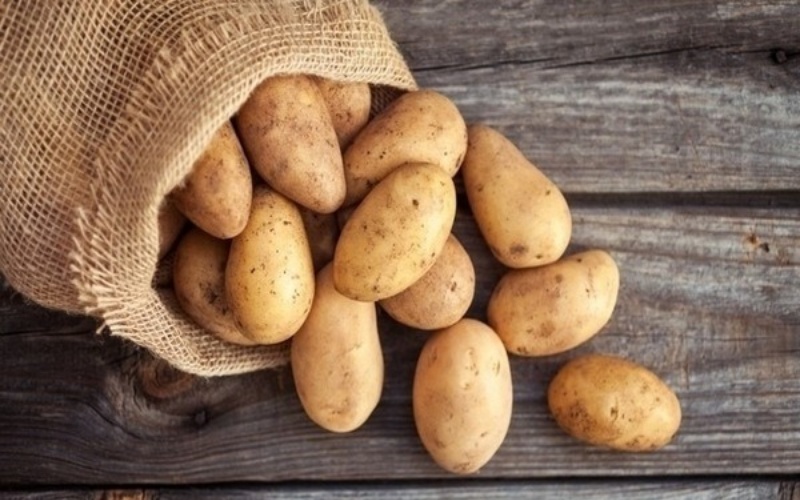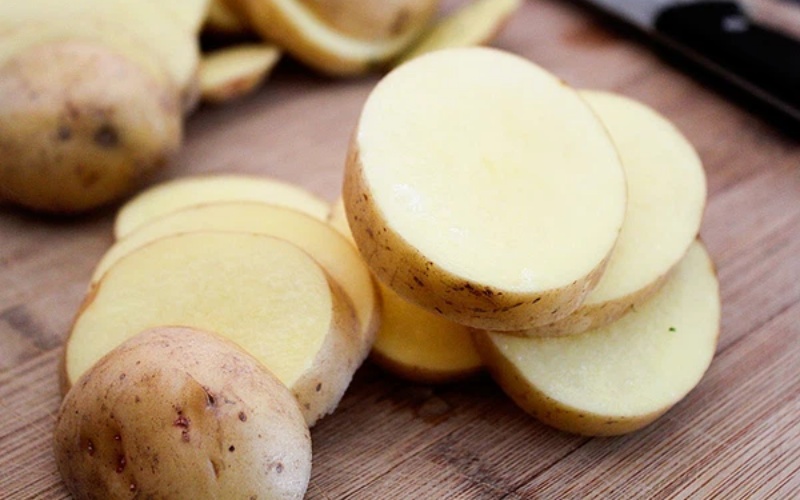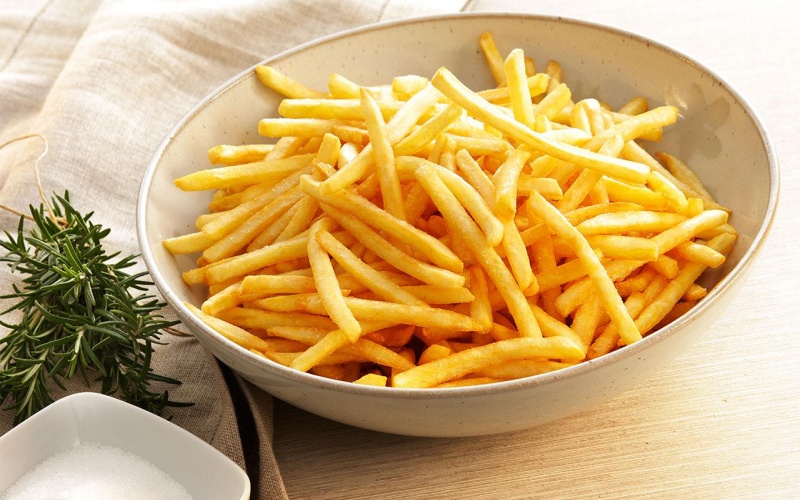Potatoes are a familiar food to many, but not everyone knows the calorie content of potatoes. Today, we will reveal the number of calories in potatoes!
1 How many calories are in 100g of potatoes?
According to research by the United States Department of Agriculture, 100g of potatoes contains approximately 76.7 calories, 6mg of iron, 2.2g of protein, and 2g of fat. This shows that the calorie content of 100g of potatoes is significantly higher than that of 100g of other starchy foods.
 100g of potatoes contains around 76 calories
100g of potatoes contains around 76 calories
Additionally, the number of calories in potatoes can vary depending on the method of preparation. For example, in 100g of potatoes:
- Boiled or steamed potatoes contain approximately 87 calories.
- Fried potatoes contain about 312 calories.
- Baked potatoes have around 93 calories.
2 Nutritional Value of Potatoes
Cooked potatoes with the skin on are a good source of various vitamins and minerals that the body needs, such as vitamin C, B6, potassium, and fiber. Water makes up a large part of the potato, and there are also small amounts of other components like carbohydrates, fiber, protein, and minimal amounts of fat.
 Nutrition in potatoes
Nutrition in potatoes
The primary form of carbohydrates in potatoes is starch, including resistant starch, which is considered beneficial for health. Potatoes also contain a type of fiber that has been shown to reduce the risk of colon cancer and lower cholesterol levels.
3 Benefits of Eating Potatoes
Supports Heart Health
Potatoes contain certain minerals and plant compounds, such as chlorogenic acid and kukoamine, that have been linked to lower blood pressure. Additionally, the high potassium content in potatoes can reduce the risk of high blood pressure and other cardiovascular issues.
Maintains Ideal Weight
Potatoes are a weight-controlling food that provides a feeling of fullness and satiety. A small study showed that consuming boiled potatoes along with yogurt resulted in lower calorie intake compared to eating white rice or pasta.
 Benefits of eating potatoes
Benefits of eating potatoes
Boosts Immune System
The vitamin C and catechin, a type of polyphenol that accounts for one-third of the total antioxidant content in potatoes, help enhance the immune system and protect the body from harmful bacteria.
Aids Digestion
The resistant starch in potatoes acts as a prebiotic fiber that feeds the beneficial bacteria in the gut, promoting a healthy digestive system.
Promotes Eye Health
Lutein and zeaxanthin are important components that help maintain eye health. Lutein, in particular, is a carotenoid antioxidant that enhances the overall health of your eyes.
4 Do Potatoes Make You Fat?
 Potatoes won’t make you fat if consumed as part of a balanced diet
Potatoes won’t make you fat if consumed as part of a balanced diet
Potatoes are not a fattening food due to their low-calorie content. Additionally, they can support your weight loss journey in the following ways:
- Promotes Satiety and Curbs Appetite: The protein and fiber in potatoes help you feel fuller for longer, reducing cravings and preventing overeating, a common cause of weight gain.
- Controls Calorie Intake: Potatoes have fewer calories than rice, bread, and other starchy foods, helping to limit overall calorie consumption. However, a balanced diet and regular exercise are also necessary.
- Nutritious Yet Low in Fat: Potatoes are rich in vitamins and minerals like potassium, vitamin C, and B6, but they are extremely low in fat, so they won’t contribute to excess fat storage.
5 Are Potatoes Good for Your Health?
As with all foods, it is generally not advisable to consume large quantities of a single food item at one time as it can lead to an imbalance in your diet and potentially cause health issues. Therefore, it’s important to consider the calorie content of potato-based dishes and maintain a balanced daily energy intake. However, if you are following a specific potato-based weight loss program, be sure to consult with a healthcare professional.
Certain individuals should avoid consuming large amounts of potatoes, including pregnant women, diabetics, and those with a potato allergy.
 Are potatoes good for your health?
Are potatoes good for your health?
6 How to Eat Potatoes for Effective Weight Loss
If you’re incorporating potatoes into your weight loss journey, here are some suggestions on how to include them in your daily meals:
Breakfast
Opt for one boiled potato with a cup of yogurt or a potato salad with a side of yogurt. This will keep you feeling full without causing any digestive discomfort, and the yogurt will aid in digestion.
Lunch
Go for half a bowl of rice, potato salad, or potato soup, along with a protein source like braised eggs, braised duck, or other dishes with minimal oil to ensure you’re getting a balanced intake of nutrients.
 Effective ways to eat potatoes for weight loss
Effective ways to eat potatoes for weight loss
Dinner
It’s best to have a light dinner with potatoes and avoid rice, as it can be hard to digest and may contribute to fat storage. Instead, pair potatoes with vegetables, potato soup with meat and vegetables, or other easily digestible, fiber-rich foods.
Remember to combine these dietary choices with an appropriate exercise regimen to achieve optimal health and a desirable body shape.
7 Delicious Potato Dishes
Potato Snacks
Potato snacks are a popular treat and are perfect for enjoying while watching a movie or chatting with friends.
These snacks are crispy, golden, and can be seasoned with salt, pepper, or your favorite spices to add extra flavor.
For more information:
 Potato snacks
Potato snacks
Mashed Potatoes
Mashed potatoes are a delicious, soft, and creamy dish that melts in your mouth. The buttery and creamy texture, along with the savory flavor, will surely delight your taste buds. Mashed potatoes also go well with fried chicken, grilled meat, and other dishes.
For more information:
 Mashed potatoes
Mashed potatoes
Oven-Baked Potatoes
Oven-baked potatoes are a European dish known for their crispy texture, golden color, and aromatic flavor, thanks to the addition of rosemary.
For more information:
 Oven-baked potatoes
Oven-baked potatoes
8 Things to Keep in Mind When Eating Potatoes
When consuming potatoes, it’s important to consider the following:
- Allergies: Potato allergies are rare and are caused by a substance called patatin found in potatoes.
- Preparation and Cooking: Potato skins and sprouts contain small amounts of glycoalkaloids, which can be toxic. Therefore, it’s important to peel potatoes thoroughly and avoid consuming sprouted potatoes.
- Avoid High-Temperature Cooking Methods: According to studies, fried potatoes have high levels of acrylamide, a substance formed when foods are cooked at high temperatures. Acrylamide has been linked to an increased risk of cancer.
For more information:
9 Potato Diet Rules for Weight Loss
In 2016, Tim Steele published a book called Potato Hack: Weight Loss Simplified, which popularized the potato diet for weight loss. According to statistics, this diet can help with weight loss of 0.45 kg per day when followed for 3-5 days.
 Potato diet rules for weight loss
Potato diet rules for weight loss
There are seven basic rules to follow:
- Rule 1: Eat only boiled potatoes for 3-5 days.
- Rule 2: Consume between 0.9 and 2.3 kg of potatoes per day.
- Rule 3: Do not eat any other foods, including condiments and sauces.
- Rule 4: Minimize salt intake as much as possible.
- Rule 5: Drink only water, unsweetened tea, or black coffee.
- Rule 6: Engage in light exercise regularly.
- Rule 7: Avoid taking non-prescription dietary supplements, but continue taking any medications prescribed by your doctor.
Note: It’s important to avoid eating fried potatoes or potatoes prepared with excessive seasoning, as these can be high in calories.
Now you know the calorie content of potatoes and how they can benefit your health. Remember to maintain a balanced diet and consult a healthcare professional if you have any concerns.
Sources: healthline.com, United States Department of Agriculture, vinmec.com
































